The struggle for the soul of the B Corp movement
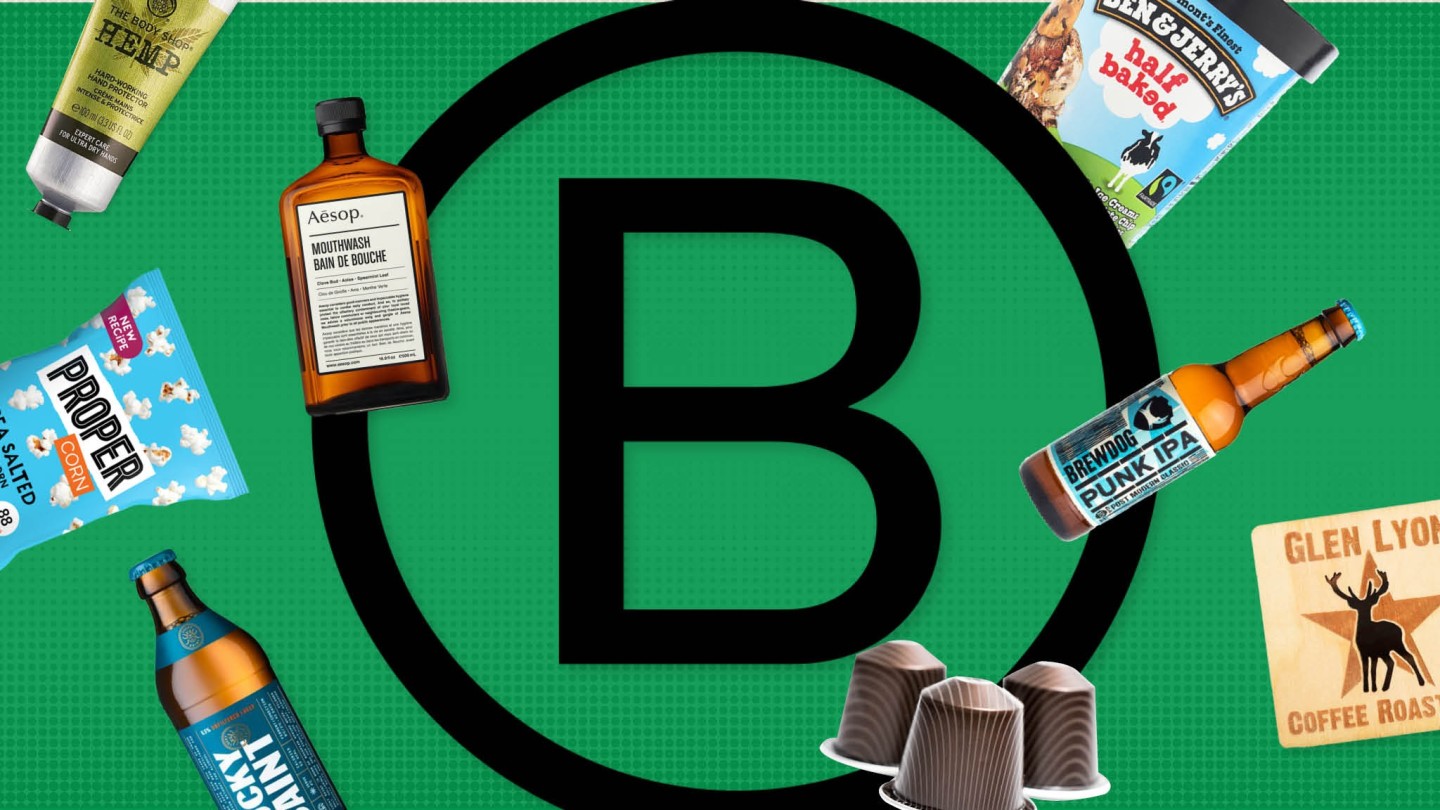
Simply sign up to the Sustainability myFT Digest -- delivered directly to your inbox.
When Nestlé subsidiary Nespresso was awarded “B Corp” status in May 2022, the founders of tiny Glen Lyon Coffee Roasters could scarcely believe it.
Their initial reaction was “dismay”, the Scottish firm said in a post on its website last summer. It had only just attained the same certification, which demonstrates enhanced commitments to environmental and social goals, and felt there was a big difference between its own achievements in that field and those of the Nestlé-owned megabrand.
Nespresso, best known for its single-serve coffee pods endorsed by actor George Clooney, emphasises it underwent a “comprehensive” assessment requiring “detailed evidence and supporting data”. But critics such as Glen Lyon point to allegations that some of its farmers are earning poverty incomes and that its capsules create huge amounts of waste.
Jamie Grant, a director at the company, says that while he acknowledges Nespresso is working to create biodegradable pods, “a line needs to be drawn somewhere to protect the reputation of the certification scheme” and businesses such as his, echoing the statement made last year.
The controversy is part of a wider debate about the future of the B Corp movement, which started in the US but now includes thousands of companies around the world who are certified as “a force for good”.
The movement came to prominence as environmental, social and governance issues rose to the top of boardroom agendas in recent years. Publicly listed corporations changed strategy and emphasised social responsibility and investors and the public demanded more on everything from executive pay to policies for tackling climate change.
Among a range of ESG benchmarks, frameworks and certifications, B Corps set out to be a widely recognised gold standard. To achieve the status, firms have to meet high levels of overall social and environmental performance, public transparency and legal accountability to balance profit and purpose.
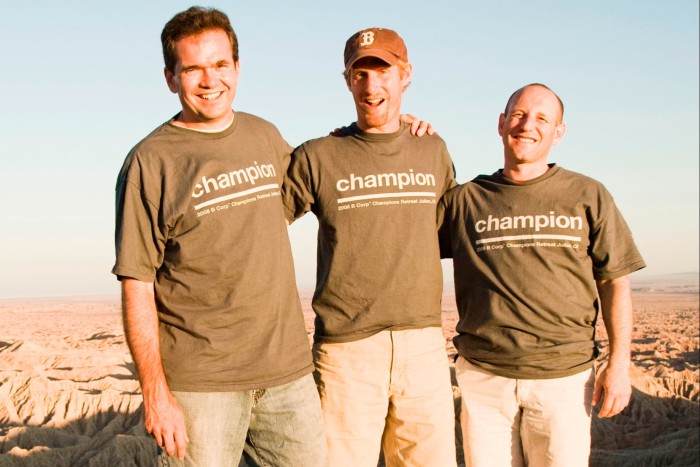
But just as the ESG agenda and so-called stakeholder capitalism have begun to feel a backlash, the B Corp ecosystem is now under scrutiny. Many of the smaller companies who were early adopters of the standards are concerned about what they perceive as a focus on enlisting multinationals and trying to get them to be “less bad” rather than to be transformationally “good”.
They have also raised questions about the credibility of B Lab, the certifying authority, setting in motion a battle for the heart and soul of the movement.
“It’s incredibly accessible. Any company can become a B Corp,” says Erinch Sahan, former chief executive of the World Fair Trade Organization who now works at the Doughnut Economics Action Lab. “It is its biggest strength, but also its biggest weakness. It doesn’t require the big changes in business that we urgently need.”
“What they do really well is creating a community of business people who are passionate about sustainability,” adds Sahan. “When you tell everyone you’re now a B Corp . . . people expect that you really do prioritise people and planet. But that’s not necessarily the case.”
The B list
B Lab was started almost 17 years ago in the US by university friends Bart Houlahan, Andrew Kassoy and Jay Coen Gilbert. It is a non-profit network with the lofty goals of revolutionising capitalism and remaking the global economy to “benefit all people, communities, and the planet”.
Today, there are about 6,400 certified B Corps around the world across 158 industries from fashion brands to fintechs. Once largely made up of smaller businesses trying to change how business was done, the pool of B Corps now also includes major companies — from Ben & Jerry’s ice cream, which is owned by Unilever, subsidiaries of French food group Danone to outerwear brand Patagonia and Natura, the Brazilian cosmetics and fragrance maker that owns Body Shop and Aesop.
The number of companies seeking certification “continues to accelerate”, Houlahan tells the Financial Times. “We are incredibly excited about the proliferation of submissions and tremendous growth, but we want to be incredibly careful. How do we scale with integrity while keeping the rigour and credibility of the certification?”
Companies gain B Corp status based on how they score out of 200 on a variety of metrics across governance, treatment of workers and customers, community and the environment. The process can be long and expensive — anywhere between $500 and $50,000 each year — and this has to be reappraised every three years. Companies, which have to get at least 80 points, are also required to legally cement the B Corp commitment into the mission statement of their company.
In the US, one way to do that would be to reincorporate as a benefit corporation, a legal structure that formally embeds societal obligations into the company’s goals and gave the B Corp movement its name. Companies in the UK must rewrite their articles of association to include a commitment to social or environmental good. This, B Lab believes, is what makes the certification more than a tick-box exercise.
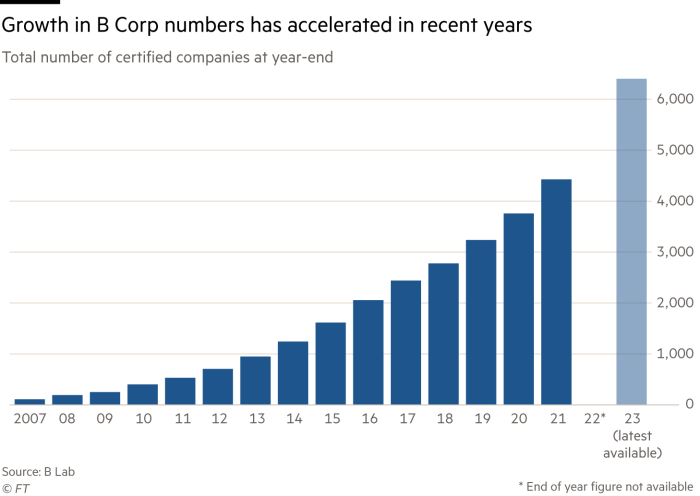
The UK is one of the fastest-growing regions for B Lab with about 1,000 companies at the end of 2022, double the number the previous year and the highest relative to its population in the world. Data from B Lab UK — one part of the global network that sits under B Lab Global, which ultimately provides the certification — shows companies outperform on revenue growth, investment levels and employee retention rates compared with those outside of the community.
Achieving certification is also good PR — both for the business and the movement. Company advertisements at train stations and product packaging increasingly display the B Corp logo in the same way they might advertise organic or Fairtrade status.
UK supermarket chain Waitrose and online grocery retailer Ocado have created virtual aisles for B Corp-certified products on their websites. One UK executive tells the FT his company was pursuing B Corp status as younger potential employees increasingly seem to demand it.
There are limits to the certification. A company may commit to paying its own employees a fair wage but there is no requirement to extend this further down the supply chain. If a company makes increased profits, how it deploys those funds is not for B Lab to dictate. It could invest in growers or farms, increase staff wages, install solar panels — or just ramp up dividends or executive pay.
For these and other reasons, questions linger over whether B Corps are enacting truly meaningful change internally and whether the effects of that change is being felt more widely. Another UK executive says that while the certification helped show the company in a good light when pitching business to clients, beyond that he does not really think about the larger purpose of the movement.
“Companies are keen to say we have a social purpose, therefore we have a good company,” says Mark Goyder, a corporate governance expert and founder of business think-tank Tomorrow’s Company. “But they don’t emphasise the how. Here are the ways we underpin this, how do you ensure values are upheld and how do you govern things like culture?”
Even if a company does manage its internal processes relatively well, there is less focus on the real-world impacts of their products and services.
“Unless B Corp starts to focus on the deep design of business — how companies are owned, who’s represented on their board, where their profits go — it risks falling far short of its own marketing claims,” says Sahan.
Other standard-setters that might be better at actually overhauling how businesses operate include Social Enterprise World Forum, Employee Ownership Association and Co-operatives UK, he says.
“We need to be very clear about what B Corp is and isn’t. It’s not social enterprise. It’s not akin to co-operatives or employee ownership. It’s not fundamentally changing the deep design of businesses. But it is helpful for assessing if a company is trying to do better on sustainability.”
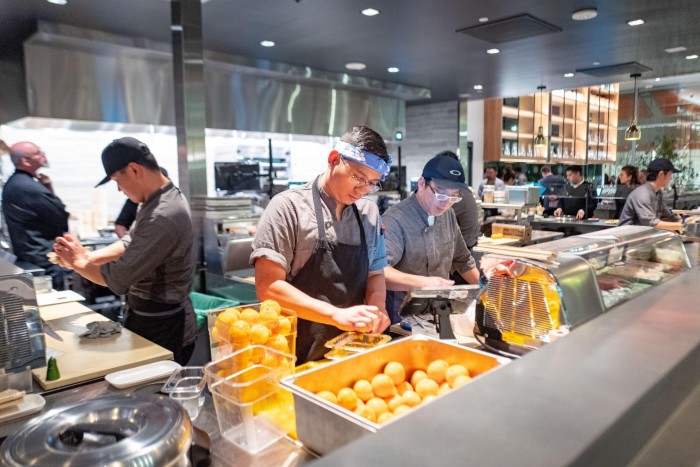
B Lab is attempting to address this criticism. It says that a change in standards from next year will force B Corps to be more prescriptive about where they stand on 10 specific topics — including fair wages, diversity and inclusion, human rights, action on climate change and risk standards — to resolve some of the issues around companies being able to rapidly meet the minimum points requirements.
At the moment, the points system allows companies to pick and choose which criteria apply to them, usually with the help of sustainability consultants, and focus on meeting them.
But Dharmash Mistry, a veteran venture capitalist and a non-executive director of the English Premier League and several listed companies, says B Corps often have too many goals already. Many of them are difficult for investors, the public and even the companies themselves to track.
“I’m looking for one positive impact metric that is linked to the growth of a company,” he says. “This way, a company can focus on it, deliver against it, and communicate it effectively. It could be a climate metric or a world sustainability goal. Companies need to keep it really simple. That is much more meaningful and over time you will be known for that,” said Mistry.
He acknowledges this means there may be other areas where companies fall short, but maintains it is a price worth paying for simplicity and clarity. “The goal is to have a net positive impact. Having a system like this is much more strategic and is better for society than filling in endless forms”.
Critical friends
There is now a growing movement to encourage B Lab to go back to its roots. About 40 individuals, including people working for some of the founding B Corps in the UK and others in the wider sustainability industry, are part of an informal WhatsApp group that views itself as a “critical friend” of B Lab, according to people familiar with their discussions.
They want B Corp to thrive, but fear that awarding the status to large multinationals that have faced criticism in the past creates confusion in the minds of consumers. They say that Nespresso, for example, could now be viewed from outside as being equivalent to a company with far higher standards.
John Steel, chief executive of Cafédirect, was reluctant to directly criticise B Corp’s certification of Nespresso. But he points out that his company was set up to give farmers a leadership position “rather than make them impoverished beneficiaries at the end of a long value chain” and argues that B Corp needs to make sure it is pushing for “systems change” at certified companies.
How to secure B Corp status
VERIFY SOCIAL AND ENVIRONMENTAL PERFORMANCE EVERY 3 YEARS
Companies must complete a B Impact Assessment, achieve a verified score of 80 points or more, and pass the disclosure questionnaire review. Verification takes place after the assessment is submitted.
“MISSION LOCK” THE COMPANY
Companies must adopt a legal framework that accounts for all stakeholders. This varies by country, and in the US and Canada, by state or province. B Lab provides assistance in choosing the right framework.
EMBRACE TRANSPARENCY
Immediately before certification, a B Impact Report is published in the B Corp Directory.
PAY THE ANNUAL FEE
Companies pay an annual fee for B Corp certification, allowing them to use the B Corp logo and other intellectual property. The cost varies by region and by the company’s gross revenues
“It’s urgent and important. B Corp needs to make sure it’s not just some kind of club. In 2023, we don’t have the luxury of time to let greenwashing rule. If they don’t raise standards there will be a dilutionary effect,” Steel says.
Some individuals who work in the sustainability industry also believe allowing subsidiaries of large corporations to attain the status even if the parent is not certified is a way for bigger companies to benefit from B Corp status without fully doing the work.
B Lab argues that in fact the bar is far higher for larger companies, recognising that “the obligations to stakeholders are greater when a company has greater scale, influence, and impact”. The recertification process also requires companies to improve every three years.
But that has not stopped a growing feeling in some quarters that a movement that expanded off the back of smaller companies now regards their views as less of a priority than B Lab’s growth plans.
Houlahan says he is at ease with dissenting opinions and has seen it all before, recalling the outrage in some parts of the movement when Ben & Jerry’s was certified in 2012 or when the first company that didn’t fall under the “organic” banner attained the status.
Opening up to more multinationals is a good thing as it meant the broader business ecosystem would change for the better, he says. That is ultimately the goal. There are several companies valued at $1bn or more that are in the pipeline, says Houlahan, but they have to be the “right” ones and only a “small number” will get the status. He adds that most B Corps — 96 per cent — are small and medium-sized businesses valued at under $100mn.
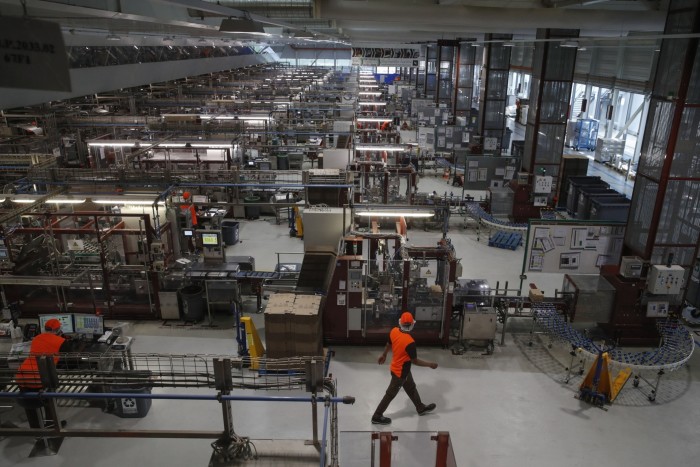
The pockets of dissent are also small compared to the swelling enthusiasm elsewhere and B Lab could in theory just ignore them. Attrition rates — companies choosing to relinquish B Corp status — are minimal. Engagement is high and the backlog of companies seeking certification stands at about 3,000, says Houlahan, though he adds it is still important to listen to critics as this helps to ultimately raise standards.
He also emphasises that when things don’t work out, a company’s certification is in genuine jeopardy.
Less than two years after the Scotland-based BrewDog attained B Corp status, its certification was revoked just as it was grappling with revelations of bullying and a “culture of fear”. It is unlikely to be restored in the near future; in December, the brewer said that B Lab “had requested additional measures from BrewDog and the BrewDog board decided that these were not something we could do at this time”.
Even when a status is retained, it does not always go to plan. Danone’s chief executive and chair, Emmanuel Faber, put the company on a path to becoming one of the first major corporations whose total sales were covered by the B Corp certification. But he was forced out by activist shareholders unhappy at his focus on sustainability. Around 70 per cent of its sales are under B Corp.
B Lab says its model means that any company, regardless of size, legal structure or industry, can gain the certification, which is now well-recognised enough to help companies differentiate themselves from traditional corporations.
While the number of B Corps is still a tiny proportion of the hundreds of millions of businesses that exist globally, the pool is still growing. Lucky Saint, which launched in 2018 with an ambition to redefine how people think about alcohol-free beer, attained B Corp status last December.
Emma Heal, the brewer’s managing director, says that as the company began to grow very fast it wanted to embed sustainability into everything from how they hired staff to how they defined their mission. She adds B Corp certification has provided a helpful benchmark and a guide from which to work.
“Just because we have the status, it doesn’t stop,” said Heal. “It’s a good carrot and stick that pushes us to be better and better.”
This is article has been amended to correct the location of Brewdog’s base
Climate Capital

Where climate change meets business, markets and politics. Explore the FT’s coverage here.
Are you curious about the FT’s environmental sustainability commitments? Find out more about our science-based targets here
Letters in response to this article:
B Corp blueprint for better business must avoid closed shop / From Jonathan Petrides, Founder and Chief Executive, allplants (Certified B Corporation), London N14, UK
Let’s recognise business isn’t always the enemy / From Ciaran Nelson, Stamford, Northamptonshire, UK
B Corp scores must include supply chain mapping data / From Natalie Grillon, Executive Director, Open Supply Hub, Amenia, NY, US
Comments